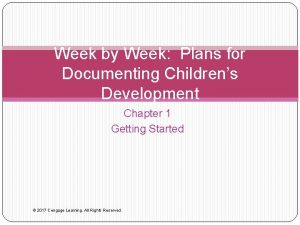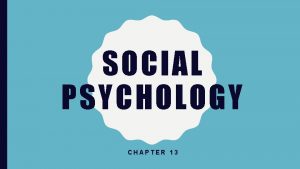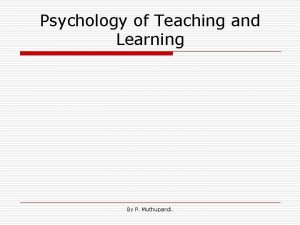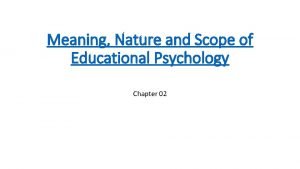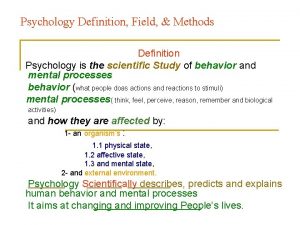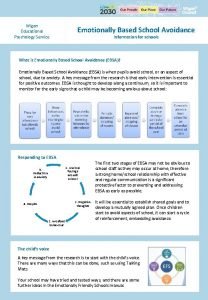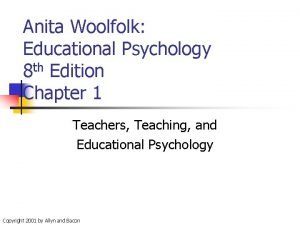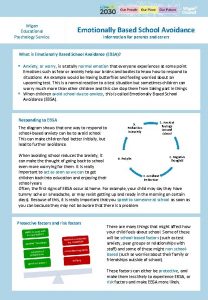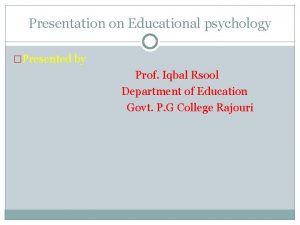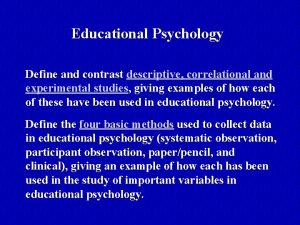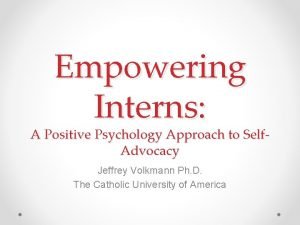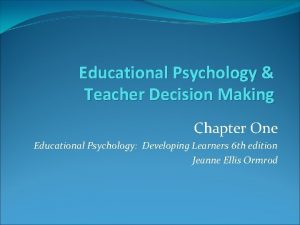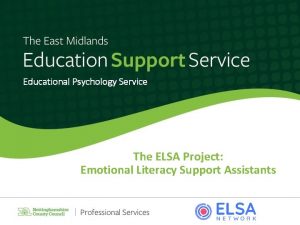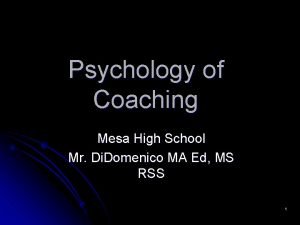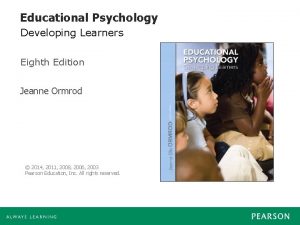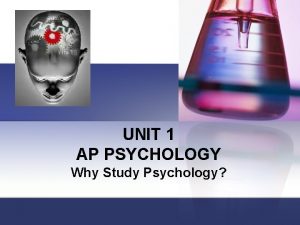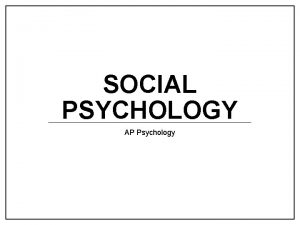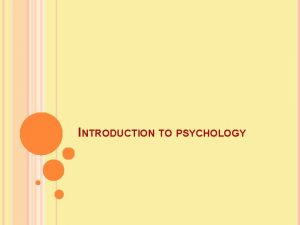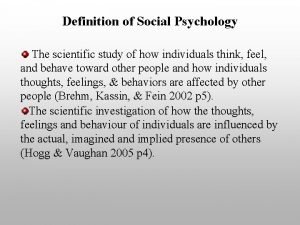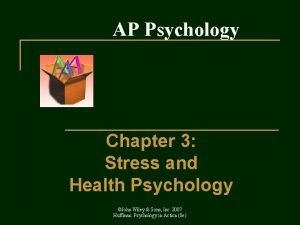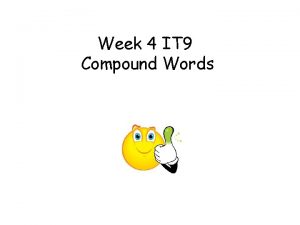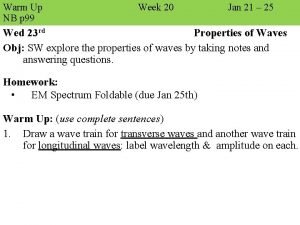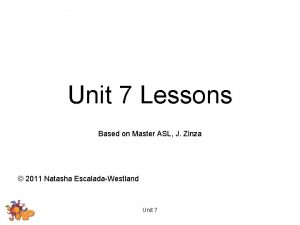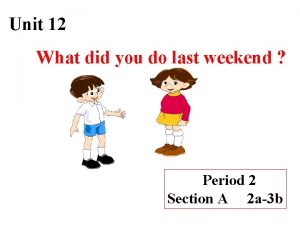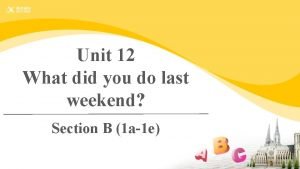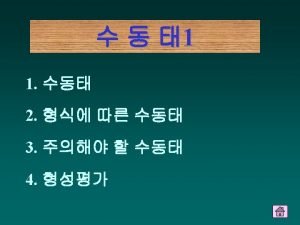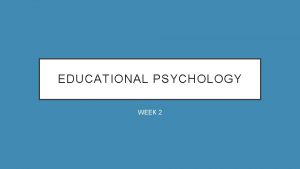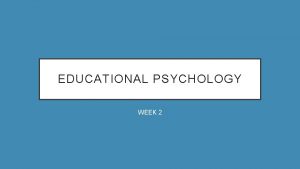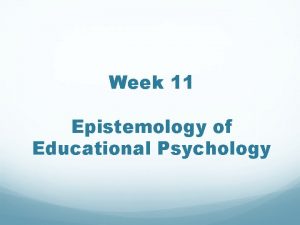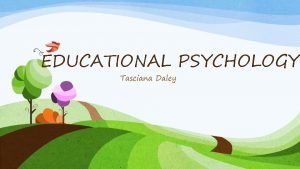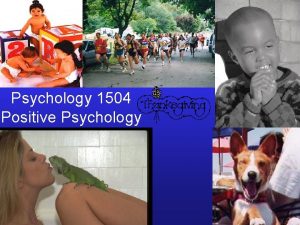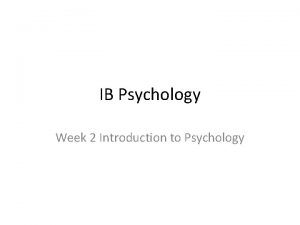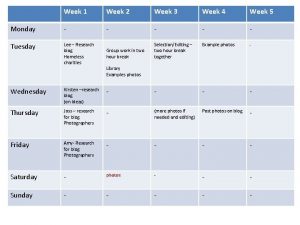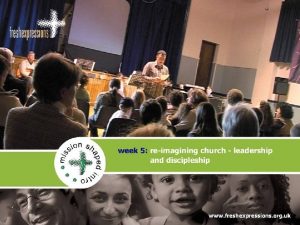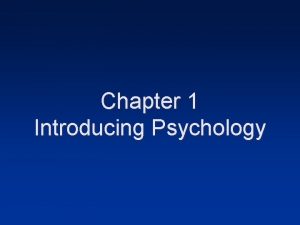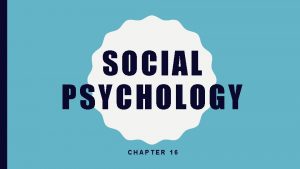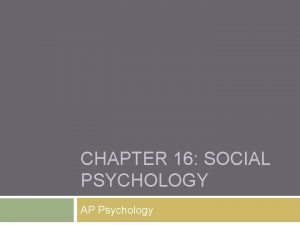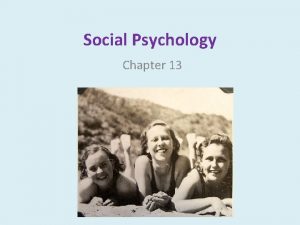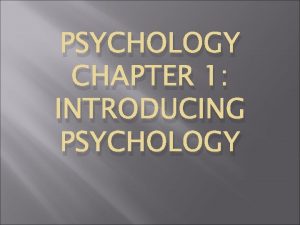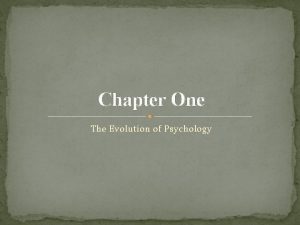EDUCATIONAL PSYCHOLOGY WEEK 2 EDUCATIONAL PSYCHOLOGY CHAPTER 1







































- Slides: 39

EDUCATIONAL PSYCHOLOGY WEEK 2

EDUCATIONAL PSYCHOLOGY CHAPTER 1

LEARNING GOALS 1. Describe some basic ideas about the field of educational psychology 2. Identify the attitudes and skills of an effective teacher 3. Discuss why research is important to effective teaching, and how educational psychologists and teachers can conduct and evaluate research

LEARNING GOALS 1. Describe some basic ideas about the field of educational psychology 2. Identify the attitudes and skills of an effective teacher 3. Discuss why research is important to effective teaching, and how educational psychologists and teachers can conduct and evaluate research

EXPLORING EDUCATIONAL PSYCHOLOGY • Educational psychology : the branch of psychology that specializes in understanding teaching and learning in educational settings • Historical Background • William James • John Dewey • E. L. Thorndike • Diversity and Early Educational Psychology • The Behavioral Approach • The Cognitive Revolution • Teaching: Art and Science

EFFECTIVE TEACHING Professional Knowledge and Skills • Subject-Matter Competence • Instructional Strategies • Constructivist approach: a learner-centered approach to learning that emphasizes the importance of individuals actively constructing knowledge and understanding with guidance from the teacher • Direct instruction approach: A structured, teacher-centered approach characterized by teacher direction and control, high teacher expectations for students’ progress, maximum time spent by students on academic tasks, and efforts by the teacher to keep negative affect to a minimum • Thinking Skills • Goal Setting and Instructional Planning

EFFECTIVE TEACHING (CONT. ) • Developmentally Appropriate Teaching Practices • Classroom Management Skills • Motivational Skills • Communication Skills

EFFECTIVE TEACHING (CONT. ) • Paying More Than Lip Service to Individual Variations • Differentiated instruction: includes recognizing variations in students’ knowledge, readiness, interests, and other characteristics, and taking these differences into account when planning curriculum and engaging in instruction • Working Effectively with Students from Culturally Diversity • Assessment Knowledge and Skills • Technological Skills Commitment, Motivation and Caring

RESEARCH IN EDUCATIONAL PSYCHOLOGY • Descriptive Research • Observation • Laboratory: A controlled setting from which many of the complex factors of the real world have been removed • Naturalistic Observation: Observation in the real world rather than a laboratory • Participant Observation: Observation conducted at the same time the teacher-researcher is actively involved as a participant in the activity or setting • Interview and Questionnaires

RESEARCH IN EDUCATIONAL PSYCHOLOGY (CONT. ) • Descriptive Research (cont. ) • Standardized Tests: Test with uniform procedures for administration and scoring. They assess students’ performance in different domains and allow a student’s performance to b compared with the performance of other students at the same age or grade level on a national basis • Case Studies: An in-depth look at an individual • Ethnography: In-depth description and interpretation of behaviour in an ethnic or a cultural group that includes direct involvement with the participants

RESEARCH IN EDUCATIONAL PSYCHOLOGY (CONT. ) • Descriptive Research (cont. ) • Focus Groups • Personal Journals and Diaries • Correlational Research

RESEARCH IN EDUCATIONAL PSYCHOLOGY (CONT. ) • Experimental Research • Independent variable • Dependent variable • Experimental group • Random assignment

RESEARCH IN EDUCATIONAL PSYCHOLOGY (CONT. ) • Program Evaluation Research: Research designed to make decisions about the effectiveness of a particular program • Action Research: Research used to solve a specific classroom or school problem, improve teaching and other educational strategies, or make a decision at a specific level • The Teacher-as-Researcher/Teacher-Researcher: This concept involves classroom teachers conducting their own studies to improve their teaching practice

RESEARCH IN EDUCATIONAL PSYCHOLOGY (CONT. ) • Quantitative Research: Employs numerical calculations in an effort to discover information about a particular topic • Qualitative Research: Involves research that blends different research designs and/or methods • Mixed Method: Involves research that blends different research designs and/or method

EDUCATIONAL PSYCHOLOGY CHAPTER 2

LEARNING GOALS 1. Define development and explain the main processes, periods, and issues in development, as well as links between development and education 2. Discuss the development of the brain and compare the cognitive developmental theories of Jean Piaget and Lev Vygotsky 3. Identify the key features of language, the biological and environmental influences on language, and how the typical growth of child’s language

AN OVERVIEW OF CHILD DEVELOPMENT • Development: The pattern of biological, cognitive and socioemotional process that begins at conception and continues through the life span. Most development involves growth, although it also eventually involves decay (dying) • Developmental Issue • Nature-Nurture issue: biological inheritance-environmental experience • Continuity-Discontinuity issue: gradual cumulative change-distinct stages • Early-Later Experience issue: early – later experiences as key determinants • Splintered development: the circumstances in which development is uneven across domains

COGNITIVE DEVELOPMENT • The Brain • Myelination: The process of encasing many cells in the brain with myelin sheath • Brain development in middle and late childhood • Brain development in adolescence • Corpus callosum: when fibers connect the brain’s left and right hemisphere • Prefrontal cortex: the highest level in the frontal lobes; involved in reasoning, decision making and self-control • Amygdala: The seat of emotions in the brain • Lateralization: The specialization of functions in each hemisphere of the brain

COGNITIVE DEVELOPMENT (CONT. ) • Piaget’s Theory • Cognitive Processes • Schema: Actions or mental representations that organize knowledge • Assimilation: The incorporation of new information into existing knowledge • Accommodation: Adjusting schemas to fit new information and experience • Organization: The grouping isolated behaviors into a higher-order, more smoothly functioning cognitive systems; the grouping or arranging of items into categories • Equilibration: A mechanism to explain how children shift from one stage of thought to the next. The shift occurs as children experience cognitive conflict, or disequilibrium, in trying to understand the world. Eventually, they resolve the conflict and reach a balance

COGNITIVE DEVELOPMENT (CONT. ) • The Sensorimotor Stage: 0 -2 years of age: infants construct an understanding of the world by coordinating sensory experiences with motor actions • The Preoperational Stage: 2 -7 years of age: symbolic thought increases, but operational thought is not yet present • Symbolic function substage: 2 -4 years of age: the ability to represent an object not present develops and symbolic thinking increases, egocentrism is present • Intuitive thought substage: 4 -7 years of age: children begin to use primitive reasoning and want to know the answer to all sort of questions. They seem so sure about their knowledge in this substage but are unaware of how they know what they know

COGNITIVE DEVELOPMENT (CONT. ) • The Preoperational Stage (cont. ) • Centration: Focusing, or centering, attention on one characteristic: to the exclusion of all others: characteristic of preoperational thinking • Conservation: The idea that some characteristic of an object stays the same even though the object might change in appearance; a cognitive ability that develops in the concrete operational stage

COGNITIVE DEVELOPMENT (CONT. ) • The Concrete Operational Stage: 7 -11 years of age: the child thinks operationally, and logical reasoning replaces intuitive thought but only in concrete situations; classification skills are present, but abstract problems present difficulties • Seriation: a concrete operation that involves ordering stimuli along some quantitative dimension • Transivity: The ability to reasons and logically combine relationship

COGNITIVE DEVELOPMENT (CONT. ) • Formal Operational Stage: 11 -15 years of age: Thought is more abstract, idealistic and logical in this stage • Hypothetical-deductive reasoning: adolescent can develop hypotheses to solve problems and systematically reach (deduce) a conclusion

COGNITIVE DEVELOPMENT (CONT. ) • Vygotsky’s Theory • Zone of Proximal Development (ZPD): the range of tasks that are too difficult for children to master alone but that can be mastered with guidance and assistance from adults or more-skills children • Scaffolding: A technique that involves changing the level of support for learning. A teacher or more-advanced peer adjusts the amount of guidance to fit the student’s current performance • Social constructivist approach: Emphasizes the social contexts of learning and that knowledge is mutually built and constructed

LANGUAGE DEVELOPMENT • Language: a form of communication, whether spoken, written, or signed, that is based on a system of symbols • Phonology: a language’s sound system • Morphology: the units of meaning involved in word formation • Syntax: the ways that words must be combined to form acceptable phrases and sentences • Semantics: the meaning of words and sentences • Pragmatic: the appropriate use of language in different contexts • Metalinguistic awareness: knowledge of language

LEARNING GOALS 1. Define development and explain the main processes, periods, and issues in development, as well as links between development and education 2. Discuss the development of the brain and compare the cognitive developmental theories of Jean Piaget and Lev Vygotsky 3. Identify the key features of language, the biological and environmental influences on language, and how the typical growth of child’s language

EDUCATIONAL PSYCHOLOGY CHAPTER 3

LEARNING GOALS 1. Describe two contemporary perspectives of socioemotional development: Bronfenbrenner’s ecological theory and Erikson’s lifespan developmental theory 2. Discuss how the social contexts of families, peers, and schools are linked with socioemotional development 3. Explain these aspects of children’s socioemotional development: selfesteem, identify, moral development, and coping with stress

CONTEMPORARY THEORIES • Bronfenbrenner’s Ecological Theory • Microsystem • Mesosystem • Exosystem • Macrosystem • Chronosystem

CONTEMPORARY THEORIES (CONT. ) • Erikson’s Life-Span Development Theory • Trust vs. Mistrust • Autonomy vs. Shame and Doubt • Initiative vs. Guilt • Industry vs. Inferiority • Identity vs. Identity Confusion • Intimacy vs. Isolation • Generativity vs. Stagnation • Integrity vs. Despair

SOCIAL CONTEXTS OF DEVELOPMENT • Families • Parenting Styles • Authoritarian parenting • Authoritative parenting • Neglectful parenting • Indulgent parenting • Co-parenting • The changing family in a changing society

SOCIAL CONTEXTS OF DEVELOPMENT (CONT. ) • Peers • Peer statuses • Friendship • Schools’ changing social developmental context • Early childhood education • Developmentally appropriate practice • The Montessori approach

SOCIOEMOTIONAL DEVELOPMENT • Self-esteem: the individual’s overall conception of her/himself • Identity diffusion: the identity status in which individuals have neither explored meaningful alternatives not made a commitment • Identity foreclosure: the identity status in which individuals have made a commitment but have not explored meaningful alternatives • Identity moratorium: the identity status in which individuals are in the midst of exploring alternatives but have not yet made a commitment • Identity achievement: the identity status in which individuals have explored meaningful alternatives and made a commitment

SOCIOEMOTIONAL DEVELOPMENT (CONT. ) • Moral development • Preconventional reasoning: Morality is often focused on reward and punishment • Punishment and obedience orientation • Individualism, instrumental purpose and exchange • Conventional reasoning: individuals abide by certain standards (internal) but they are the standards of others such as parents or the laws of society (external) • Mutual interpersonal expectation, relationships and interpersonal conformity • Social system morality • Postconventional reasoning: morality is more internal • Social contract or utility and individual rights • Universal ethical principles

SOCIOEMOTIONAL DEVELOPMENT (CONT. ) • Prosocial Behavior • Altruism: an unselfish interest in helping another person • Gratitude: a feeling of thankfulness and appreciation, especially in response to someone doing something kind or helpful • Moral Education • Hidden curriculum: every school has a pervasive moral atmosphere even if it does not have a program of moral education • Character education: a direct approach to moral education that involves teaching students basic moral literacy to prevent them from engaging in immoral behavior and doing harm to themselves or others

SOCIOEMOTIONAL DEVELOPMENT (CONT. ) • Moral Education • Value clarification: an approach to moral education that emphasizes helping people clarify what their lives are for and what is worth, working for, students are encouraged to define their own values and understand the values of others • Cognitive moral education: an approach to moral education based on the belief that students should value things such as democracy and justice as their moral reasoning develops; Kohlberg’s theory has served as the foundation of many cognitive moral education efforts • Service learning: a form of education that promotes social responsibility and service to the community

SOCIOEMOTIONAL DEVELOPMENT (CONT. ) • Coping with Stress

LEARNING GOALS 1. Describe two contemporary perspectives of socioemotional development: Bronfenbrenner’s ecological theory and Erikson’s lifespan developmental theory 2. Discuss how the social contexts of families, peers, and schools are linked with socioemotional development 3. Explain these aspects of children’s socioemotional development: selfesteem, identify, moral development, and coping with stress

Q UI Z
 Week by week plans for documenting children's development
Week by week plans for documenting children's development Educational psychology chapter 1
Educational psychology chapter 1 Group thinking psychology
Group thinking psychology Definition of education according to john dewey
Definition of education according to john dewey What is scope of educational psychology
What is scope of educational psychology Field psychology definition
Field psychology definition Emotionally based school avoidance
Emotionally based school avoidance Anita woolfolk educational psychology
Anita woolfolk educational psychology Wigan educational psychology service
Wigan educational psychology service Educational psychology conclusion
Educational psychology conclusion Define educational psychology
Define educational psychology Positive psychology internships
Positive psychology internships Discuss briefly the nature of educational psychology
Discuss briefly the nature of educational psychology Educational psychology
Educational psychology Educational psychology
Educational psychology Cie
Cie Psyc 1504 learning journal unit 1
Psyc 1504 learning journal unit 1 Ormrod educational psychology
Ormrod educational psychology Schools of educational philosophy chapter 9
Schools of educational philosophy chapter 9 Positive psychology ap psychology definition
Positive psychology ap psychology definition Social psychology ap psychology
Social psychology ap psychology Psychology studies
Psychology studies Social psychology definition psychology
Social psychology definition psychology Health psychology definition ap psychology
Health psychology definition ap psychology Htcondor week
Htcondor week Htcondor week 2022
Htcondor week 2022 Ana ascenção e silva
Ana ascenção e silva Dgp week 11 answers 9th grade
Dgp week 11 answers 9th grade Dgp week 8 answers
Dgp week 8 answers Compound words with ball at the end
Compound words with ball at the end Week 16 dgp
Week 16 dgp Cannibal canoe hurricane and barbecue
Cannibal canoe hurricane and barbecue Dgp week 30
Dgp week 30 Dgp week 20 answers
Dgp week 20 answers Tv turn off week
Tv turn off week Spatial organization asl
Spatial organization asl What did you do the last weekend
What did you do the last weekend What did your last weekend look like
What did your last weekend look like Kanji days of week
Kanji days of week Window was broken
Window was broken
